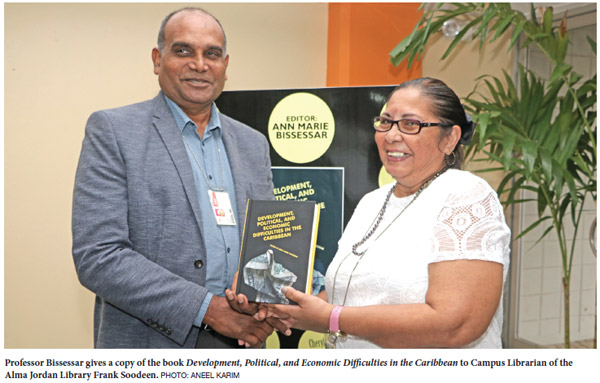
 It’s been one of the most persistent challenges facing Caribbean society - how to free our economies from dependence on a few industries and commodities. Diversification has been a priority for policymakers, planners and academics for decades. Yet progress has been remarkably slow. Why? How do we change? It’s been one of the most persistent challenges facing Caribbean society - how to free our economies from dependence on a few industries and commodities. Diversification has been a priority for policymakers, planners and academics for decades. Yet progress has been remarkably slow. Why? How do we change?
A brand new book written by a diverse group of scholars from UWI St Augustine and edited by Professor Ann Marie Bissessar, Dean of the Faculty of Social Sciences (FSS), uses a fresh approach to answer these questions and provide policymakers with workable solutions. Instead of examining diversification as a purely economic problem the multidisciplinary team looks at the issue from a range of perspectives - risk and financing, politics, community development, corruption and many others. Its title is Development, Political, and Economic Difficulties in the Caribbean.
“We have a lot of things written about diversification - usually from the economic and planning perspective,” says Professor Bissessar. “This book is different because it incorporates different academic ideas on diversification.”
Development was published by Palgrave Macmillan and contains 16 chapters with different areas of focus relating to diversification. Topics include portfolio management, human capital, tourism, sustainable agriculture, austerity, the global recession and parliamentary committees, among others. Apart from Trinidad it looked at Jamaica, Cuba and Martinique.
The articles are written by emerging scholars and graduate students. This was intentional:
“I thought this book was an avenue to hone the skills of the new academics, the young academics,” says the FSS Dean. “It is difficult to make a breakthrough in the world of academia. This book gives these young academics the opportunity to publish with a reputable publisher.”
On March 21 a book launch for Development was held at the FSS Lounge on campus. Senior economist Winston Dookeran, UWI’s Professor of Practice for International Diplomacy, said in his remarks at the launch:
“This book is a most welcome contribution and perhaps a preface to a project on Caribbean Convergence. In focusing on the diversification challenge of the region, the ideas lead naturally to capturing new economic space, so essential for making strategic choices on the future of the Caribbean economy…”
Professor Bissessar, who also wrote Development’s first and final chapters, would like to see the findings and prescriptions in the book utilised by region’s governments. Like many others she is deeply concerned about the condition of Caribbean society and sees diversification as crucial for the region’s well-being.
“If we do not diversify we are going down a dangerous path,” she says.
She is however hopeful that broad-based solutions that include not only governments and the private sector, but also the citizenry themselves can bring about the change that has remained so elusive for all these years.
(Joel Henry) |





